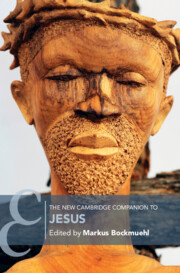Book contents
- The New Cambridge Companion to Jesus
- Cambridge Companions to Religion
- The New Cambridge Companion to Jesus
- Copyright page
- Contents
- Contributors
- Acknowledgements
- A Note on Referencing and Abbreviations
- Introduction
- Part I Origins
- Part II The Diversity of Reception
- Part III Ethics, Theology, and Critical Scholarship
- Part IV The Global Jesus Today
- Part V Outlook
- 22 The Future of Jesus of Nazareth
- Bibliography
- Ancient Sources Index
- Subject Index
- Cambridge Companions to Religion
- References
22 - The Future of Jesus of Nazareth
Yesterday, Today, and Tomorrow
from Part V - Outlook
Published online by Cambridge University Press: 15 November 2024
- The New Cambridge Companion to Jesus
- Cambridge Companions to Religion
- The New Cambridge Companion to Jesus
- Copyright page
- Contents
- Contributors
- Acknowledgements
- A Note on Referencing and Abbreviations
- Introduction
- Part I Origins
- Part II The Diversity of Reception
- Part III Ethics, Theology, and Critical Scholarship
- Part IV The Global Jesus Today
- Part V Outlook
- 22 The Future of Jesus of Nazareth
- Bibliography
- Ancient Sources Index
- Subject Index
- Cambridge Companions to Religion
- References
Summary
Jesus of Nazareth’s future engages Christian hope and the fulfillment of creation’s purpose. Jesus’s earthly life and divine identity are inseparable. This union both constitutes and challenges perceptions of linear time and functions creatively to intertwine past, present, and future. Jesus’s transformative impact on humanity and history signifies the final reconciliation and realization of God’s kingdom, which is manifest both in his historical presence and in his eternal nature.
- Type
- Chapter
- Information
- The New Cambridge Companion to Jesus , pp. 365 - 378Publisher: Cambridge University PressPrint publication year: 2024

